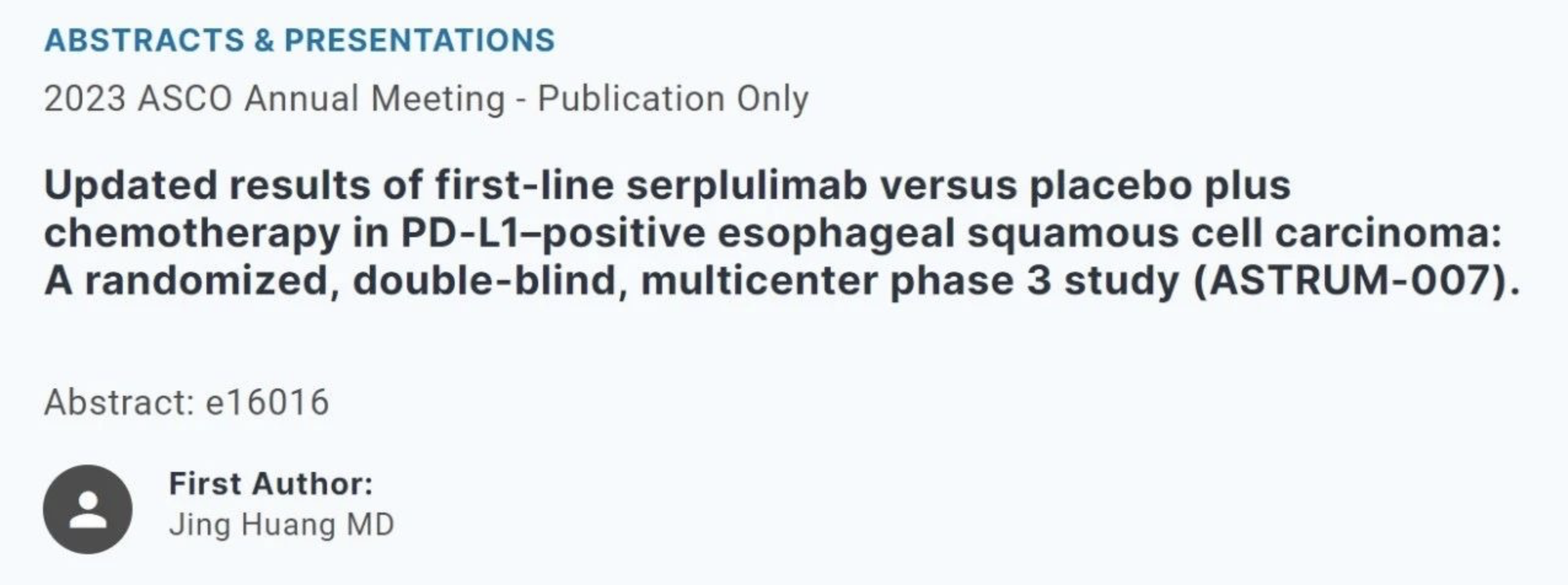Shanghai, China, May 26th, 2023 –Shanghai Henlius Biotech, Inc. (2696.HK) announced that the updated results of the phase 3 clinical study (ASTRUM-007) of company’s self-developed innovative anti-PD-1 mAb, HANSIZHUANG (serplulimab), targeting the first-line treatment of esophageal squamous cell carcinoma (ESCC), were released as online abstract by 2023 American Society of Clinical Oncology (ASCO) Annual Meeting. ASTRUM-007 was led by Professor Jing Huang from National Cancer Center/National Clinical Research Center for Cancer/Cancer Hospital, Chinese Academy of Medical Sciences and Peking Union Medical College.

Esophageal cancer is one of the most common malignancies in the world. According to the latest data, the incidence and mortality of esophageal cancer rank sixth and fifth, respectively, among all malignant tumors in China, of which ESCC accounts for about 85.79% of all esophageal cancer cases[1]. Many studies have shown that anti-PD-1 mAb combined with chemotherapy can bring survival benefits to patients with esophageal cancer. Immune checkpoint inhibitor combined with chemotherapy has become the standard first-line treatment for advanced esophageal cancer in China[2]. The results of ASTRUM-007, a clinical trial conducted by Henlius for ESCC, have been presented at the 2022 CSCO Annual Meeting and ESMO Asia Congress 2022. Its updated data released at 2023 ASCO Annual Meeting are as follows:
Title
Updated results of first-line serplulimab versus placebo plus chemotherapy in PD-L1–positive esophageal squamous cell carcinoma: A randomized, double-blind, multicenter phase 3 study (ASTRUM-007) (Abstract No. e16016)
Study design
In this randomized, double-blind, multicenter phase 3 study, patients with histologically confirmed locally advanced or distantly metastatic, PD-L1–positive (CPS ≥1) esophageal squamous cell carcinoma (ESCC) who had no prior systemic antitumor therapy were randomized 2:1 to receive serplulimab 3 mg/kg or placebo plus chemotherapy (5-FU + cisplatin) intravenously Q2W. Randomization was stratified by PD-L1 expression level (CPS ≥10 vs CPS <10), age (≥65 vs <65 years), and disease status (locally advanced vs distantly metastatic). The primary endpoints were IRRC-assessed progression-free survival (PFS) per RECIST v1.1 and OS. Secondary endpoints included other efficacy measures, safety, quality of life, and biomarkers.
Results
Between June 19, 2019 and December 17, 2021, 976 patients were screened and 551 were randomized (serplulimab-chemotherapy, n=368; placebo-chemotherapy, n=183). At this updated analysis, median follow-up duration was 24.2 months. Median OS was significantly longer in the serplulimab-chemotherapy group than the placebo-chemotherapy group (14.6 vs 11.2 months; hazard ratio [HR] 0.70, 95% CI 0.57–0.86; P=0.0006). IRRC-assessed median PFS per RECIST v1.1 was prolonged with the addition of serplulimab (6.5 vs 5.3 months; HR 0.58, 95% CI 0.47–0.72). Efficacy improvements were also observed in confirmed objective response rate (58.7% vs 42.1%) and duration of response (median, 7.1 vs 4.6 months) as assessed by IRRC per RECIST v1.1.
Grade ≥3 treatment-related adverse events were reported in 203 (53.1%) and 82 (48.8%) patients in the respective groups. Incidence of grade ≥3 immune-related adverse events were 9.2% and 3.0% in the serplulimab-chemotherapy group and the placebo-chemotherapy group, respectively.
Conclusion
With another 9.3 months of follow-up, the encouraging efficacy and manageable safety of serplulimab plus chemotherapy as first-line treatment in patients with PD-L1–positive advanced ESCC were maintained, further supporting the development of serplulimab plus 5-FU and cisplatin for previously untreated ESCC patients.
【参考文献】
[1] Chen R, Zheng R, Zhang S, et al. Patterns and trends in esophageal cancer incidence and mortality in China: an analysis based on cancer registry data[J]. Journal of the National Cancer Center, 2023.
[2] 食管癌诊疗指南(2022年版). 中国国家卫生健康委员会.
About HANSIZHUANG
HANSIZHUANG (recombinant humanized anti-PD-1 monoclonal antibody injection, generic name: serplulimab injection) is the first anti-PD-1 mAb for the first-line treatment of SCLC. Up to date, 3 indications are approved for marketing in China, 2 marketing applications are under review in China and the EU, and more than 10 clinical trials are ongoing across the world.
HANSIZHUANG was launched in March 2022 and has been approved by the NMPA for the treatment of MSI-H solid tumours, squamous non-small cell lung cancer (sqNSCLC) and extensive-stage small cell lung cancer (ES-SCLC). The marketing applications of the first-line treatment for esophageal squamous cell carcinoma (ESCC) and ES-SCLC are under review by the NMPA and the EMA, respectively. Focus on lung and gastrointestinal cancer, the synergy of HANSIZHUANG with in-house products of the company and innovative therapies are being actively promoted. It has successively obtained clinical trial licenses in China, the United States, the European Union and other countries and regions to initiate 14 clinical trials on immuno-oncology combination therapies in a wide variety of indications. As of now, the company has enrolled more than 3,500 subjects in China, the U.S., Turkey, Poland, Georgia and other countries and regions, and the proportion of White is over 30% in two MRCTs, making HANSIZHUANG an anti-PD-1 mAb with one of the largest global clinical data pools. The results of pivotal trials of HANSIZHUANG were published in the Journal of the American Medical Association (JAMA, IF: 157.3), Nature Medicine (IF: 87.241), the British Journal of Cancer (IF: 9.075) and Frontiers in Immunology(IF:8.786), respectively. On the other hand, HANSIZHUANG was recommended by the CSCO Guidelines for Small Cell Lung Cancer, the CSCO Guidelines for Non-Small Cell Lung Cancer, the CSCO Guidelines for Esophageal Cancer, the CSCO Guidelines for Colorectal Cancer, the CSCO Clinical Practice Guidelines on Immune Checkpoint Inhibitor, the China Guidelines for Radiotherapy of Esophageal Cancer and other definitive guides, providing valuable references for clinical diagnosis and treatment of tumours. Furthermore, serplulimab was granted orphan drug designations by the FDA and the EC for the treatment of SCLC, and the first patient has been dosed in a bridging head-to-head trial in the United States to comparing HANSIZHUANG to standard of care Atezolizumab (anti-PD-L1 mAb) for the first-line treatment of ES-SCLC.
